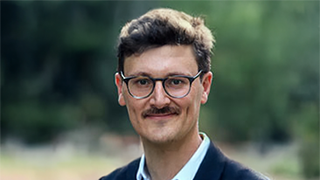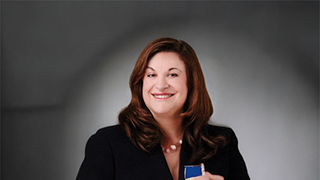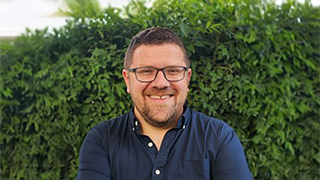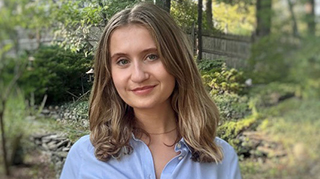Inside the Core
Friday, September 19, 2025
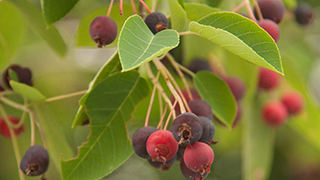
Inside the Core this fall, we are bringing a focus on the environment into our classes in several ways. For one thing, the Catholic Intellectual Tradition (CIT) committee, of which the Core Director is a part, has decided that Pope Francis’ Laudato Si, in its tenth anniversary, will be the theme of the year. This choice fits beautifully with the first year reading choice for this year, The Serviceberry: Abundance and Reciprocity in the Natural World by Robin Wall Kimmerer (Scribner 2024). The wisdom of these two texts will be interwoven in the classes we teach.
Kimmerer uses the serviceberry of the title as an emblem for what she envisions as a “gift economy” embodied in the life cycles of plants, like these abundant berries, and lived out in the generosity of her farmer neighbors who share them. A member of the Potawatomi nation as well as a botanist and Distinguished Teaching Professor of Environmental Biology at SUNY, she argues for a rethinking of the individualistic and selfish way our culture and economic system interact with the environment. Instead, as her own cultural heritage teaches her, we might combine gratitude and respect for nature with a generosity of its use that puts community and the common good before individualistic profit as the main driver. Enjoying one’s neighbors eating berries from one’s land, for free, is only one of countless examples of an economy of sharing that can be transformative.
This model fits beautifully with the respect and even reverence for nature as a gift from a loving Creator that underlies Pope Francis’ ground-breaking text, Laudato Si. Taking his inspiration from Saint Francis, whose prayer of praise to God for creation (“Laudato Si” – “Praise to you”) inspired the title, Pope Francis interweaves concern for the environment with social justice, as Saint Francis combined love of nature and concern for the poor. Francis argues, “We must regain the conviction that we need one another, that we have a shared responsibility for others and the world, and that being good and decent are worth it…. When the foundations of social life are corroded, what ensues are battles over conflicting interests, new forms of violence and brutality, and obstacles to the growth of a genuine culture of care for the environment” (Chapter 6, 148). This text is used in Core II, but in connection with Serviceberry, it can inform the way many texts in Core I link to what Francis calls for — ecological conversion.
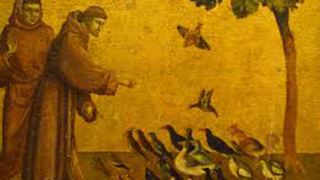
Giotto's "St. Francis Preaching to the Birds "
A concern for the environment is implicit in Exodus, one of the texts we read in Core I, where chapter 23:10-11 conveys the Lord’s command to Israel: “For six years you are to sow your fields and harvest the crops but during the seventh year let the land lie unplowed and unused. Then the poor among your people may get food from it, and the wild animals may eat what is left. Do the same with your vineyard and your olive grove.” Concern for the sabbath rest commanded for the land is linked to caring for the poor as well as the animals. In fact, Pope Francis refers to this part of Exodus, as the Lord further commands Israel to keep the Sabbath, not simply as a religious rule, but “so that your ox and your donkey may have rest, and the son of your maidservant, and the stranger, may be refreshed” (Ex.23:12). Francis goes on to say, “Rest opens our eyes to the larger picture and gives us renewed sensitivity to the rights of others. And so the day of rest, centered [for Christians] on the Eucharist, sheds its light
In Serviceberry, Kimmerer references Marshall Sahlins, who “names generalized reciprocity as the heart of a gift economy, which functions most effectively in small close-knit communities. Those who have give to those who don’t so that everyone in the system has what they need” (33). This description parallels almost exactly that of the early church as described in the book of Acts:
The entire community of believers was united in heart and soul. No one claimed any of his possessions as his own, for everything was held in common. With great power, the apostles bore witness to the resurrection[g] of the Lord Jesus, and they were all greatly respected. There was never anyone among them in need, because those who were the owners of lands or houses would sell them, bring the proceeds of the sale, and lay them at the feet of the apostles, to be distributed to any who were in need. (Acts 4:32-35)
Communities can be based on mutual concern and unselfish sharing, rather than individualism and economic competition. Caring for the environment can flow more easily in such a context, when linked, as it needs to be, with the common good.
Pope Leo XIV follows in the legacy of Pope Francis, in fact, offering this prayer for the environment as his intention for this month of September: "Let us pray that, inspired by Saint Francis, we might experience our interdependence with all creatures who are loved by God and worthy of love and respect.” In early September, Pope Leo started the use of land in the property of Castel Gandolfo, the summer residence for the popes, as the Borgo Laudato Si’ ecology project. According to Vatican News, “The project reflects the vision of Pope Francis, who first opened up the Papal Villa to the public and established the initiative in 2023. Pope Francis aimed to promote ecological education by creating a dedicated space for training and raising awareness about environmental issues” (Paul Samasuto, Vatican City). For more information on the project, click here.
Inside the Core, and at Seton Hall in general, let’s continue to find ways in which we too can cultivate an environment respectful of God’s creation and enhancing the common good.
Categories: Campus Life, Education, Faith and Service, Nation and World


